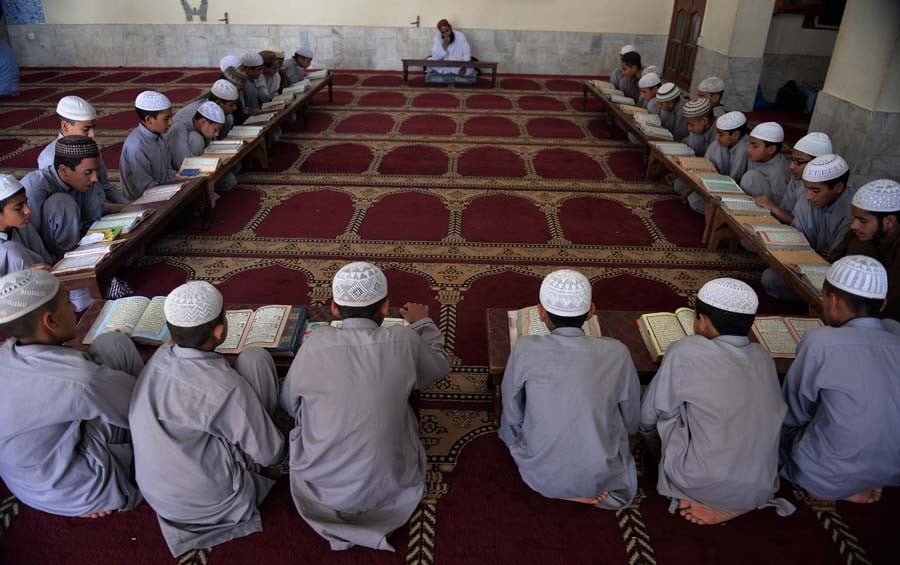
In the contemporary social milieu, fundamentalism is a product of modernity -- a problem of the literate

A student killed his professor in Bahawalpur over a disagreement on organising a welcome party. In the viral video circulating on social media, the accused not only accepted his crime but also looked content at his action. However, it wasn’t the act of butchery that surprised me, but the contentment on the killer’s face.
How could he be so certain about his actions? What is it that provides certainty to his actions? Did he not have a moment of self-doubt? How could he take another human being’s life in the name of religion that advocates sanctity of human life?
One might try to find an answer in his fundamentalist beliefs. The Oxford English Dictionary defines fundamentalism as "strict adherence to ancient or fundamental doctrines, with no concessions to modern developments in thought or customs". However, in this article, I argue, that fundamentalism does not exist as a traditional mode of knowledge against the modern one. In fact, in the contemporary social milieu, fundamentalism is a product of modernity vis-a-vis universal modern education.
Anthony Giddens, a cultural critic, in his book The Consequences of Modernity, discusses the intimate link between modernity and certitude. He writes that "when the claims of reason replaced those of tradition, they appeared to offer a sense of certitude greater than that provided by pre-existing dogma". He attributes this to modernity’s ability to justify itself through the self-reflexive application of knowledge -- modern discourses are able to justify themselves by rationally eliminating all the biases. The method of elimination often leads to just one possible true answer. All other truths are fables.
I would like to explain this further through an illustration. Imagine you’re a student sitting for an examination of social sciences. You’re handed out an MCQ’s sheet and asked to tick one correct answer. The question consists of various problems about social life in Pakistan. The moment you start finding the one ‘true’ answer to those problems, you begin internalising the desire to seek absolute truths in your life.
It is precisely the nexus of this kind of social certainty and modern education that according to Fredrich Nietzsche, a controversial German philosopher, "corrupts a youth" and instructs him "to hold in higher esteem those who think alike than those who think differently". The space for duality, opposing rationalities reduce drastically. Anything that does not fit in one’s own system of rationality, is therefore irrational and should be eradicated for good.
Nietzsche passionately opposed the idea of universal education. In his essay, "Schopenhauer as Educator", Nietzsche advocates exclusive education and writes that "achieving a true education is an enterprise fraught with "three dangers" -- those "of isolation, of crippling doubt, and of the pain of confronting one’s limitations." However, universal education by becoming ‘common’ degrades the academic standards and produces unthinking, self-centered citizens that suit the state.
Michel Foucault, in his book Discipline and Punish, explores how schools were created on the model of jails. He traces how the system of juvenile detention centres evolved into schools. The detention centres were highly organised facilities which kept juvenile criminals under strict surveillance and regimen. The adherents of rules of the detention were rewarded, while those who refused to become compliant were punished. The same method of reward and punishment was later on introduced in schools to create patriotic citizens of the state. The sole purpose of the universal school education was to create citizens who could read enough to become compliant subjects of the state.
This can be further reiterated by the fact that universal education is a colonial legacy in Pakistan. The British created schools to produce subjects loyal to the crown. After the population census of 1872, the idea of majority Hindu and the minority Muslim emerged. The colonial government introduced Anglo-Muhammadan law and Gentoo Code to the Indian public sphere to regulate Muslim and Hindu subjectivities, respectively. The British used, al-Hidayah, a 12th-century legal manual by Burhan al-Din al-Marghinania, an influential text in Hanafi Jurisprudence to create Anglo-Mohammadan law and Vivādārṇavasetu, a Hindu Law in 21 taragas to form the Gentoo code. The sense of majority and the minority was further enhanced in the schools which encourage modern and fixed Muslim and Hindu subjectivities, in opposition to the traditional polymorphous identities.
The relationship of universal education and fundamentalism saw a rise during Zia-ul-Haq’s Islamisation. Zia’s regime, like his colonial predecessors, and under the neo-colonial American patronage introduced Islamic Studies as a compulsory subject which propagated the state’s version of Islam and didn’t take into account different versions and oral practices of the religion. The exclusion of multiple versions of religion and the creation of a singular version makes it easier for the state to govern its citizens.
It is not a surprise that the British introduced the Criminal Tribes Act of 1871. The tribes had an oral existence and were seen as a continuous threat to the British authorities because of their refusal to assimilate. They didn’t adhere to any modern meta-narrative of nationhood or religion. Their imagination was limited to the welfare of their tribe. This also meant that their non-existent relationship with universal education also enabled them to resist modern fundamentalist ideologies.
The relationship between violence and literacy is further explored by Leonard Shlain in his book The Alphabet vs The Goddess. Shlain argues that historical evidence suggests that literate societies have always been more violent and prone to radicalisation than oral societies. He attributes this to the fixed nature of the written word which gives timeless permanence to its adherents, unlike the oral word which has the capacity to mould itself according to the situation.
Fundamentalism, therefore, becomes a problem of the literate. Unless one has the capacity to question the prevalent discourses, and the system of their respective rationality, there is a danger of returning to the fundamentals or the very basics of a text without any complexity.